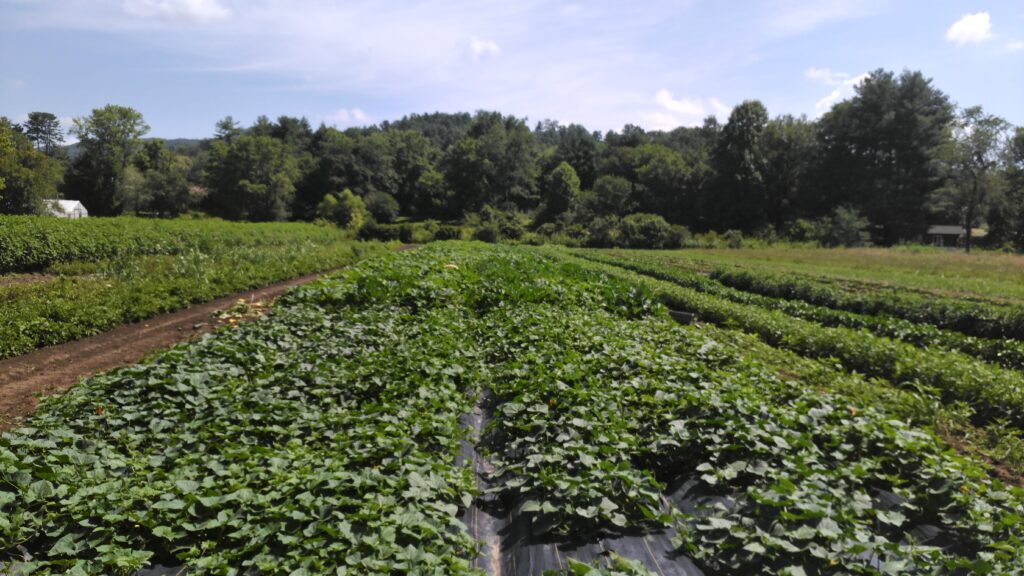Organic Food Sales Continue to Increase
go.ncsu.edu/readext?936147
en Español / em Português
El inglés es el idioma de control de esta página. En la medida en que haya algún conflicto entre la traducción al inglés y la traducción, el inglés prevalece.
Al hacer clic en el enlace de traducción se activa un servicio de traducción gratuito para convertir la página al español. Al igual que con cualquier traducción por Internet, la conversión no es sensible al contexto y puede que no traduzca el texto en su significado original. NC State Extension no garantiza la exactitud del texto traducido. Por favor, tenga en cuenta que algunas aplicaciones y/o servicios pueden no funcionar como se espera cuando se traducen.
Português
Inglês é o idioma de controle desta página. Na medida que haja algum conflito entre o texto original em Inglês e a tradução, o Inglês prevalece.
Ao clicar no link de tradução, um serviço gratuito de tradução será ativado para converter a página para o Português. Como em qualquer tradução pela internet, a conversão não é sensivel ao contexto e pode não ocorrer a tradução para o significado orginal. O serviço de Extensão da Carolina do Norte (NC State Extension) não garante a exatidão do texto traduzido. Por favor, observe que algumas funções ou serviços podem não funcionar como esperado após a tradução.
English
English is the controlling language of this page. To the extent there is any conflict between the English text and the translation, English controls.
Clicking on the translation link activates a free translation service to convert the page to Spanish. As with any Internet translation, the conversion is not context-sensitive and may not translate the text to its original meaning. NC State Extension does not guarantee the accuracy of the translated text. Please note that some applications and/or services may not function as expected when translated.
Collapse ▲
Field of certified organic cucurbits in western North Carolina.
5/17/2023 – We are in the process of hiring a new vegetable researcher/extension specialist/teacher in our department. During the course of the interviews, the question about the status of organic food production has come up several times. Are organics as popular as they used to be? With the economy as it is, are consumers still buying organics? Is it a production system that North Carolina farmers should consider trying or expanding?
Some recent surveys and reports indicate that organic food production is still very popular. In the May 15, 2023 issue of Growing Produce, there is an article on the 2023 organic industry survey produced on behalf of the Organic Trade Association by Nutrition Business Journal. Here are a few quotes from that article;
“Organic food sales in the U.S. in 2022 broke through $60 billion for the first time, hitting another high-level mark for the resilient organic sector.”
“The sector’s four-percent growth in sales value was nearly twice the pace of growth in 2021. Organic food sales totaled $61.7 billion, while the value of organic non-food sales hit nearly $6 billion. Certified Organic now accounts for 6% of total food sales in the U.S.”
“Organic produce, often the entry point for new organic buyers, easily held its position as the top seller of all organic categories. Sales of organic produce totaled $22 billion, accounting for 15% of all fruit and vegetable sales in this country.”
Next I went to the USDA Economic Research Service to see what they have to say about the organic industry:
“88 percent of organic sales occur through conventional and natural food supermarkets and chains. The remainder of sales occur through farmers markets, Community Supported Agriculture (CSAs), other direct-to-consumer sales, and internet sales. The share of organic food sold to consumers via the internet has grown from 2 percent in 2012 to 6 percent in 2020 (Organic Trade Association, 2021).”
“At the retail level, organic products typically receive a price premium over non-organic products.”
“On average, U.S. organic farms have higher production costs than conventional farms, although organic price premiums over conventional products at the farm and retail level may give farmers the opportunity to recover the elevated cost of production of farming organically.”
In February 2023, ReportLinker released a report on the global organic food market. Here are a few quotes from that report:
“The organic food market is expected to grow to $437.36 billion in 2026 at a CAGR [compund annual growth rate] of 14.0%.”
“North America was the largest region in the organic food market in 2022. Western Europe was the second largest region in the organic food market.”
The USDA Agricultural Marketing Service tracks certain segments of the organic market, too. I tried to do some price organic vs. non-organic fresh vegetable comparisons, but we just don’t have enough product in either category moving out of North Carolina right now to do so, but here is the link to check for yourself another time: USDA Market News Specialty Crop Reports.
So, the response to the original question about the status of the organic food market is “the demand for organic food is growing and organic agriculture is a production system that North Carolina farmers should consider.” If you are considering an organic farming operation, please take advantage of the many resources we have available in North Carolina, starting with your county extension center, Carolina Farm Stewardship Association, Center for Environmental Farming Systems, and Organic Growers School, just to name a few.


